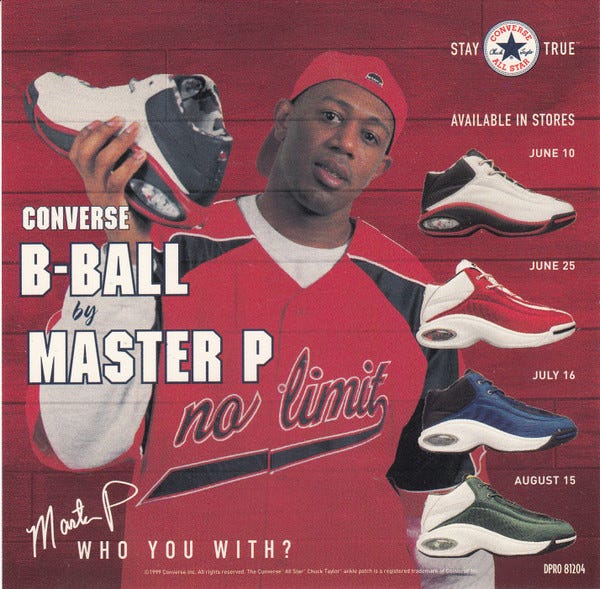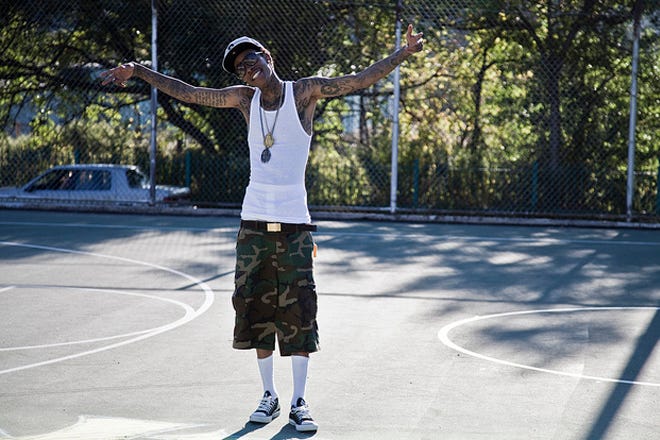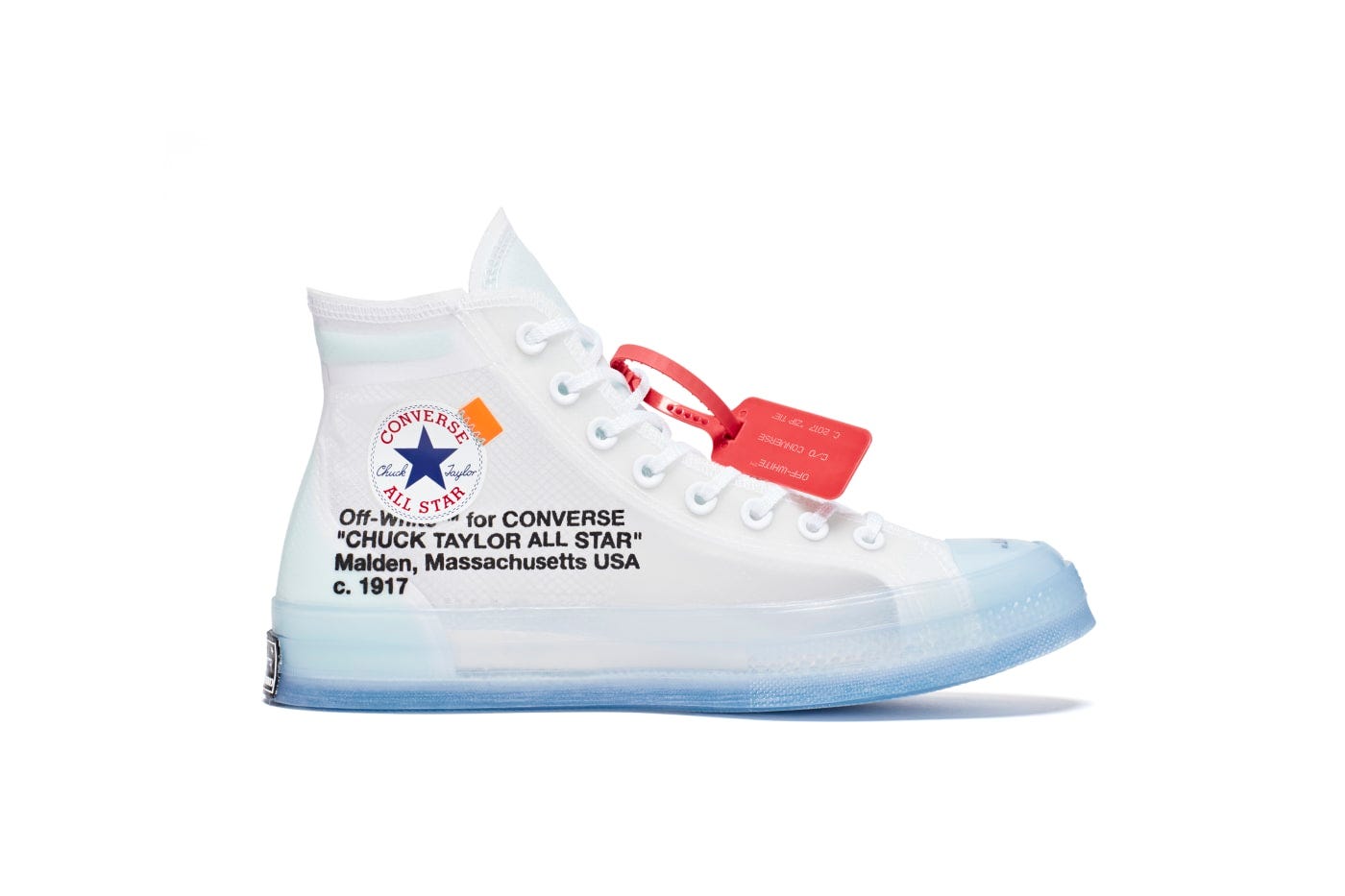Converse: A Classic Sneaker Brand with Heavy Hip-Hop Heritage
Converse is one of the most iconic brands in American history. Seriously, is there anything more classic than a pair of Chucks?
Although Converse doesn’t dominate daily conversations in fashion and sneaker culture in the same way that Nike or Adidas does, it’s definitely regarded in that same way.
Whether you’re a hustler or a hipster, you've probably worn a pair of Chucks. You can wear them to a job interview, a date, or even to the gym (I wouldn’t recommend it, but you could though).
And while Converse is more or less known for its Americana-esque persona, many don’t know that Hip-Hop culture has had a major influence on it its growth over the years.
The Story on Converse Starts in 1908…
Converse was founded by Marquis Mills Converse in Malden, Massachusetts.
Initially, Marquis focused on manufacturing rubber-soled shoes for various sports, like tennis and basketball, but struck gold in 1917 with the introduction of the Converse All-Star basketball shoe.
His early sneakers became all the rage for hoopers in those days, and over time the All-Star would later become known as the Chuck Taylor All-Star — a nod to the semi-pro basketball player and Converse shoe salesman who helped popularize the shoe: Charles "Chuck" Taylor.
As its popularity grew, Chuck Taylors became a cultural symbol, transcending its athletic origins to become an integral part of various subcultures, including rock 'n' roll, punk, and hip-hop. By the 50’s, they was considered standard footwear for high-school students and teens everywhere.
With that said, the 60s weren't even the peak for Converse. In fact, The 70s proved to be THE decade for the iconic shoe in no small part because of punk rock groups like the Ramones, who were widely regarded as the kings of punk rock (and are a heavily sampled group in Hip-hop), and the grunge movement that was come decades later.
By The 80s…
Hip-hop was just in its infancy, but Converse was bound to catch on. It still had some popularity amongst basketball players, and Nike/Adidas didn’t have a hold on the market just yet. Because of that, Chucks were still a go-to shoe amongst the youth.
“Growing up in Compton (Los Angeles) in the 80s, I started wearing Chuck Taylors by watching my older brothers, my friends, my uncles. All the gangbangers wore Chuck Taylors” - Ice Cube, N.W.A. Dazed Digital
At the turn of the decade, Chucks swept across California, in no small part, because of LA gang culture.
As gang culture took over Los Angeles and Gangsta rap entered the mainstream, Chucks became synonymous with gang culture. That meant it would impact music culture as a by-product.
As a result of this cultural shift, hip-hop’s biggest stars on rap’s biggest coast began wearing Chucks in their videos and during performances.Take N.W.A., for example.
As N.W.A. became the face of Los Angeles rap, their fashion choices permeated the world. Moreover, with members like Eazy-E having close ties to the skateboarding community (who were wearing shoes like Chucks), one can infer that it inspired his fashion. That meant that the culture would eventually embrace them in the same way.
In the 90s…
Converse continued to lean into its hip-hop roots by partnering with one of the hottest independent artists of that decade: Master P.
According to Sports Business Journal, In 1999, Master P started No-Limit Sports, and through a partnership with Converse, they created a line of co-branded footwear that would be a part of his next venture No-Limit Footwear.
"It's a fun CD to listen to -- there's a lot of energy to it and it kind of gets you prepared to play, gets you ready for the game," he said. "I think a lot of stadiums will play it, too." - Master P, MTV News
P even made CD dedicated to the his B-Ball shoe along with a song (legend says you can find it on YouTube)
Only 4 years later, Converse would be acquired by Nike for the tune of $305m and the plot thickens from there.
Let’s go to the 2010s…
The Blog Era & Beyond
A new wave of Converse’s popularity in hip-hop was fueled in no small part by the blog era. Thanks to the blogs, a ton of independent rappers gained exposure outside of the record label system — one of the standouts was Wiz Khalifa.
I. Wiz Khalifa & Taylor Gang
Wiz’s presence brought a few elements back to hip-hop that were missing — mainly stoner culture, and with that, a sense of fashion that wasn’t based on wearing high-end clothing. Wiz had a joy-free spirit and he made it was about wearing fly clothes, skate brands, and shoes like Chuck Taylor.
And thus, 9 times out 10, if you saw Wiz he was wearing Camo shorts and a pair of Chucks. He even named his crew Taylor Gang
But it doesn’t stop there.
II. Tyler, The Creator x Golf La Fleur
In 2010 Converse decided to lean into their Cali roots — the ones established by Cali rap in the 80s by partnering with the one and only Tyler, The Creator.
Because of the blogs, a collective known as Odd Future was beginning to make waves nationally, and their frontman Tyler was a fashionista in his own right.
Tyler and Odd Future had a foothold on hipster/hypebeast culture, and Tyler specifically is known for his commitment to fashion. Given that, he brought his eclectic style to the Converse brand in the form of Golf Le Fleur (seen below).
Then Converse Doubled Down on Hip-Hop
In the midst of their run of hip-hop partnership, Converse doubled down on their hip-hop roots by launching the 2011 campaign
Converse Rubber Tracks
Rubber Tracks was an initiative that allowed Converse to build 11 studio spaces for musicians to record and even included the release of an online sample library the music producers could use that was filled with royalty-free sounds.
The project ran for years and extended globally, and recording studios globally including Abbey Road in London, Sunset in Los Angeles, and Stankonia in Atlanta gave access to their burgeoning artists. Converse fans were also treated to exclusive content like behind-the-scenes interviews with Havoc from Mobb Deep.
In the years to follow, a new era of streetwear emerged fueled by new heroes in fashion. Converse’s acquisition by Nike put them at the center of culture in a different way, and as Nike was refreshing their retro’s with the help of Virgil Abloh, so did Converse.
I. Virgil Abloh & The Chuck 70
In the same year Converse jumped off their partnership with Vince Staples, they reached out to Virgil Abloh (RIH) for a collaboration with Off-White. The partnership encompassed Virgil redesigning the Chuck 70 sneaker. Like most Off-White collabs, they instantly sold out (as did the subsequent restock).
II. Vince Staples
During the same year as the Off-White Collaboration, Converse began working with rapper Vince Staples.
Vince is a Long Beach, CA native, and Chucks were a staple on the west coast. Knowing those two things, the brand reached out to Vince creating the perfect partnership.
With Vince Staples Converse had a champion whose authenticity shines through across interviews, and who’s reach could inspire a new generation of hip-hop fans to continue rocking Chuck Taylors.
WHAT NOW?
I mean… It’s about what you would expect.
Converse is continuing its run by reaching out to other Hip-hop influencers like Don C & Asap Nast for their own lines and their relevance culturally is without question.
I’d venture to say that Chucks are so classic they’ll never go out of style. I think my shoe list for this summer just got longer, hopefully yours did too.
Peace.









Awesome! For the point on wearing them to the gym, I've been noticing a ton of bodybuilders wearing chucks or vans. In brief convo, they dig them for the stability. Them being flat helps the lifter stay in one place not worry about the heel shifting them forward as they dip.
Love this. Such a unique history as a sneaker that has transformed throughout the years.
A constant feature in multiple cultures.